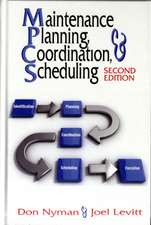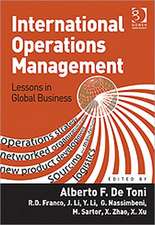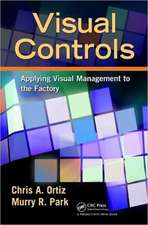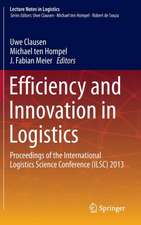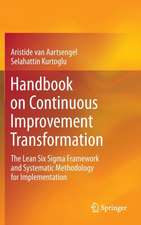Multiobjective Scheduling by Genetic Algorithms
Autor Tapan P. Bagchien Limba Engleză Hardback – 30 aug 1999
Multiobjective flowshops, job shops and open shops are each highly relevant models in manufacturing, classroom scheduling or automotive assembly, yet for want of sound methods they have remained almost untouched to date. This text shows how methods such as Elitist Nondominated Sorting Genetic Algorithm (ENGA) can find a bevy of Pareto optimal solutions for them. Also it accents the value of hybridizing Gas with both solution-generating and solution-improvement methods. It envisions fundamental research into such methods, greatly strengthening the growing reach of metaheuristic methods.
This book is therefore intended for students of industrial engineering, operations research, operations management and computer science, as well as practitioners. It may also assist in the development of efficient shop management software tools for schedulers and production planners who face multiple planning and operating objectives as a matter of course.
| Toate formatele și edițiile | Preț | Express |
|---|---|---|
| Paperback (1) | 1220.57 lei 6-8 săpt. | |
| Springer Us – 28 oct 2012 | 1220.57 lei 6-8 săpt. | |
| Hardback (1) | 1229.10 lei 6-8 săpt. | |
| Springer Us – 30 aug 1999 | 1229.10 lei 6-8 săpt. |
Preț: 1229.10 lei
Preț vechi: 1498.90 lei
-18% Nou
Puncte Express: 1844
Preț estimativ în valută:
235.22€ • 255.41$ • 197.58£
235.22€ • 255.41$ • 197.58£
Carte tipărită la comandă
Livrare economică 23 aprilie-07 mai
Preluare comenzi: 021 569.72.76
Specificații
ISBN-13: 9780792385615
ISBN-10: 0792385616
Pagini: 376
Ilustrații: XIII, 358 p.
Dimensiuni: 155 x 235 x 26 mm
Greutate: 0.77 kg
Ediția:1999
Editura: Springer Us
Colecția Springer
Locul publicării:New York, NY, United States
ISBN-10: 0792385616
Pagini: 376
Ilustrații: XIII, 358 p.
Dimensiuni: 155 x 235 x 26 mm
Greutate: 0.77 kg
Ediția:1999
Editura: Springer Us
Colecția Springer
Locul publicării:New York, NY, United States
Public țintă
ResearchDescriere
Multiobjective Scheduling by Genetic Algorithms describes methods for developing multiobjective solutions to common production scheduling equations modeling in the literature as flowshops, job shops and open shops. The methodology is metaheuristic, one inspired by how nature has evolved a multitude of coexisting species of living beings on earth.
Multiobjective flowshops, job shops and open shops are each highly relevant models in manufacturing, classroom scheduling or automotive assembly, yet for want of sound methods they have remained almost untouched to date. This text shows how methods such as Elitist Nondominated Sorting Genetic Algorithm (ENGA) can find a bevy of Pareto optimal solutions for them. Also it accents the value of hybridizing Gas with both solution-generating and solution-improvement methods. It envisions fundamental research into such methods, greatly strengthening the growing reach of metaheuristic methods.
This book is therefore intended for students of industrial engineering, operations research, operations management and computer science, as well as practitioners. It may also assist in the development of efficient shop management software tools for schedulers and production planners who face multiple planning and operating objectives as a matter of course.
Multiobjective flowshops, job shops and open shops are each highly relevant models in manufacturing, classroom scheduling or automotive assembly, yet for want of sound methods they have remained almost untouched to date. This text shows how methods such as Elitist Nondominated Sorting Genetic Algorithm (ENGA) can find a bevy of Pareto optimal solutions for them. Also it accents the value of hybridizing Gas with both solution-generating and solution-improvement methods. It envisions fundamental research into such methods, greatly strengthening the growing reach of metaheuristic methods.
This book is therefore intended for students of industrial engineering, operations research, operations management and computer science, as well as practitioners. It may also assist in the development of efficient shop management software tools for schedulers and production planners who face multiple planning and operating objectives as a matter of course.
Cuprins
Preface. 1. Shop Scheduling: An Overview. 2. What are Genetic Algorithms? 3. Calibration of GA Parameters. 4. Flowshop Scheduling. 5. Job Shop Scheduling. 6. Multiobjective Optimization. 7. Niche Formation and Speciation: Foundations of Multiobjective GAs. 8. The Nondominated Sorting Genetic Algorithm: NSGA. 9. Multiobjective Flowshop Scheduling. 10. A New Genetic Algorithm for Sequencing the Multiobjective Flowshop. 11. A Comparison of Multiobjective Flowshop Sequencing by NSGA and ENGA. 12. Multiobjective Job Shop Scheduling. 13. Multiobjective Open Shop Scheduling. 14. Epilog and Directions for Further Work. References. Appendix. Glossary. Index.



